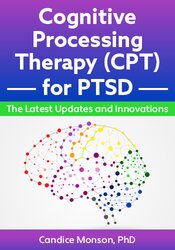
×

Cognitive Processing Therapy (CPT: Resick, Monson, & Chard, 2017) is one of the front-line recommended therapies for PTSD recommended in multiple treatment guidelines globally. CPT is a short-term, trauma-focused therapy that is comprised predominantly of cognitive interventions. CPT has four primary phases, including: 1) Providing psychoeducation about PTSD from a cognitive perspective; 2) engaging in cognitive-behavioral self-monitoring; 3) implementing cognitive interventions that target trauma appraisals; and 4) addressing overgeneralized beliefs stemming from traumatic experience.
In this presentation, participants will have the opportunity to explore various aspects of CPT and the data that supports its effectiveness. The theoretical foundations that inform personalized case conceptualization for individuals with a range of multiple traumas and diagnoses will be presented. A demonstration of Socratic dialogue using video-recorded materials from a real case will be shown, and major updates included in the new edition of the manual to be released April 2024 will be reviewed. Innovations in the delivery of CPT, including intense dosing, personalized length, MDMA-and psilocybin-assisted CPT, and delivery to individuals with comorbid PTSD-BPD will be described for discussion.
Earn up to 1.25 CE hours. Please see below, for more details, as credit amounts vary by jurisdiction and profession.

PESI, Inc., #1062, is approved as an ACE provider to offer social work continuing education by the Association of Social Work Boards (ASWB) Approved Continuing Education (ACE) program. Regulatory boards are the final authority on courses accepted for continuing education credit. ACE provider approval period: January 27, 2023 - January 27, 2026. Social workers completing this course receive 1.25 Clinical continuing education credits.
Course Level: Intermediate Format: Recorded asynchronous distance. Full attendance is required; no partial credits will be offered for partial attendance.
Canadian Social Workers: Canadian provinces may accept activities approved by the ASWB for ongoing professional development.
PESI, Inc. is approved by the Canadian Psychological Association to offer continuing education for psychologists. PESI, Inc. maintains responsibility for the program. This program is approved for 1.25 self-study continuing education hours. Full credit statement at: www.pesi.com/cpa-statement
This self-study activity qualifies for 1.25 continuing education clock hours as required by many national, state and local licensing boards and professional organizations. Save your activity advertisement and certificate of completion, and contact your own board or organization for specific requirements.
| File type | File name | Number of pages | |
|---|---|---|---|
| Manual - CPT for PTSD (9.48 MB) | 37 Pages | Available after Purchase | |
| Manual - CPT for PTSD - French (9.48 MB) | 37 Pages | Available after Purchase | |
| Manual - CPT for PTSD - Italian (9.48 MB) | 37 Pages | Available after Purchase |

Candice Monson, PhD, is Professor of Psychology at Toronto Metropolitan University. She is one of the foremost experts on traumatic stress and the use of individual and conjoint therapies for PTSD. Dr. Monson has received numerous awards for her clinical, teaching, and research contributions, including Fellow status in the Canadian and American Psychological Associations and Association of Behavioral and Cognitive Therapies, and induction into the Royal Society of Canada. Dr. Monson has published over 170 peer-reviewed publications and co-authored 8 books, including the treatment manuals Cognitive Processing Therapy: A Comprehensive Manual and Cognitive-Behavioral Conjoint Therapy for PTSD. Dr. Monson is well-known for her clinical training and therapy dissemination efforts.
Speaker Disclosures:
Financial: Candice Monson has employment relationships with Nellie Health and Toronto Metropolitan University. She receives compensation as a consultant. Candice Monson receives royalties as a published author. She receives a speaking honorarium from PESI, Inc. She has no relevant financial relationships with ineligible organizations.
Non-financial: Candice Monson is a member of the Ontario Psychological Association and is a fellow with the American Psychological Association, the Canadian Psychological Association, and the Association for Advancement of Behavior Therapy.
Visit our FAQ page at https://www.pesicanada.com/faq or contact us at https://www.pesicanada.com/contact-us
Prevalence and understanding of trauma as transdiagnostic risk factor
Overview of treatment efficacy of PTSD treatment and limitations of the research
Theory underlying CPT
Overview of CPT protocol
Efficacy and effectiveness trials supporting CPT (Resick et al., in press)
Future Directions for Research
| 5 |
|
| 4 |
|
| 3 |
|
| 2 |
|
| 1 |
|
Satisfaction Guarantee
Your satisfaction is our goal and our guarantee. Concerns should be addressed to info@pesicanada.com.
Please wait ...